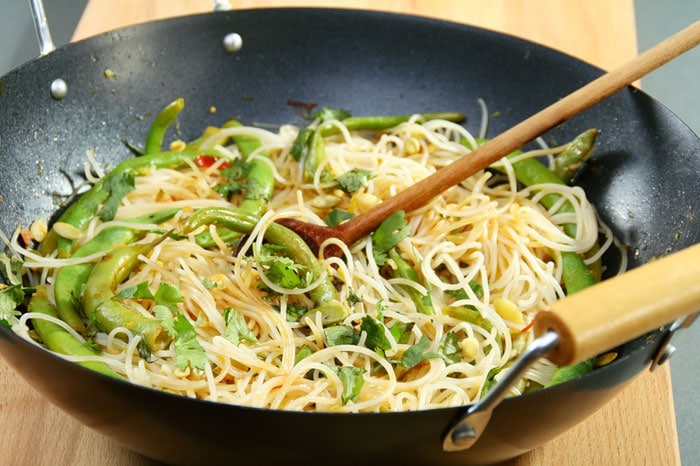Sometimes the food we eat is about much more than our taste preferences or nutritional needs. Food is a very social part of our lives, so it’s no surprise that food is connected to many traditions and superstitions throughout the world. Here are a few of our favorite food superstitions you might not know!

10 Superstitions About Food
- Long noodles for long life: In Chinese culture, noodle length symbolizes the length of the eater’s life. Therefore, you should never cut noodles before serving them, or you will be symbolically cutting short the life of the person you serve them to.
- Menudo to cure a hangover: Menudo is a traditional Mexican soup made from broth, tripe, and red chillies. It is often served at large parties and celebrations, but in the Southern United States it is also believed to be a hangover cure.
- Spilled salt is an evil omen: Have you ever seen someone throw salt over their shoulder? They’re trying to avoid the bad luck that comes from spilling salt, best captured in the German proverb “Whoever spills salt arouses enmity.” A pinch of salt thrown over the left shoulder is believed to counteract the evil omen by landing in the face of the devil sitting in his traditional place.
- Make a wish upon a wishbone: While stars might be prettier things to wish upon, the wishbone is a central part of Thanksgiving and Christmas turkey meals. Two people each take an end of the wishbone and pull it apart. Whoever gets the biggest piece will have their wish granted.
- Garlic to ward off evil: You’ve probably heard that garlic is the ultimate vampire-repellant, but did you know that it is also believed to protect you from the evil eye? Whatever evils may haunt you, garlic is the traditional way to ward them off.
- Tangerines and oranges for Chinese New Year: Tangerines are given as a gift at Chinese New Year to bring the receiver prosperity, and oranges for good fortune. The Chinese character for tangerine is similar to that for gold, and the symbol for orange is similar to good luck
- Black-eyed peas for a prosperous year: In the Southern United States, black-eyed peas are the first food served on New Year’s Day. They symbolize luck and prosperity for the year ahead, with some people believing they represent coins, and even assigning them a specific value. Sometimes a coin is added to the pot before serving, and the person who gets it will have the best luck in the new year.
- Christmas pudding for wishes and luck: Speaking of putting coins in food, it’s British tradition to put coins in the Christmas pudding before baking. Whoever gets the coins is blessed with good luck. And there’s another superstition related to this food: Each family member takes a turn stirring the pudding batter, and while doing so makes a wish.
- 12 grapes for 12 wishes: In Spain and in Latin American cultures, as the clock strikes 12 at midnight on New Year’s Eve, you should eat one grape with each chime of the clock. You must manage to eat all 12 grapes before the clock finishes chiming to get 12 wishes.
- Birthday cake wishes: The tradition of burning candles on a birthday cake comes from the ancient Greek tradition of celebrating the birthday of Artemis, Goddess of the moon. The candles were placed on the cake to ward off the evil spirits attracted by the party. Today, blowing out all the candles means you will be granted a wish.
The Bottom Line
Choosing your foods based on superstition may not be a great way to ensure a balanced meal, but engaging in a few traditional food rituals can certainly add some festivity to big events like Christmas and New Year’s Eve.
Alumni: University of Victoria – Christina Newberry is a writer and editor whose work has appeared in national and local magazines and newspapers. With a Bachelor’s degree in English and Anthropology from the University of Victoria and a Journalism Certificate from Langara College, Christina brings keen curiosity and the love of a good story to her work with HealthCastle.com.
Christina is a passionate traveler and urban gardener with an interest in vegetarian eating and making good, tasty food from scratch. Sharing lessons learned from her own experiences, Christina writes about lifestyle topics for HealthCastle, with a focus on eating well at home and on the road.


